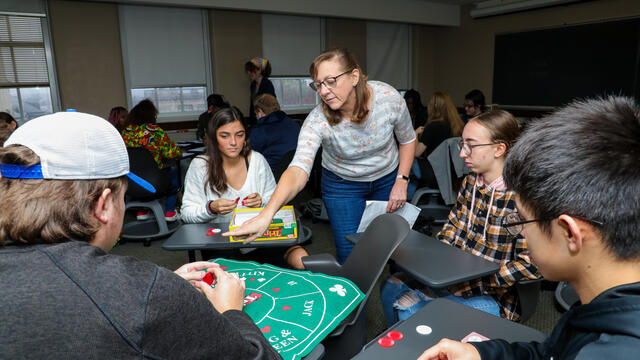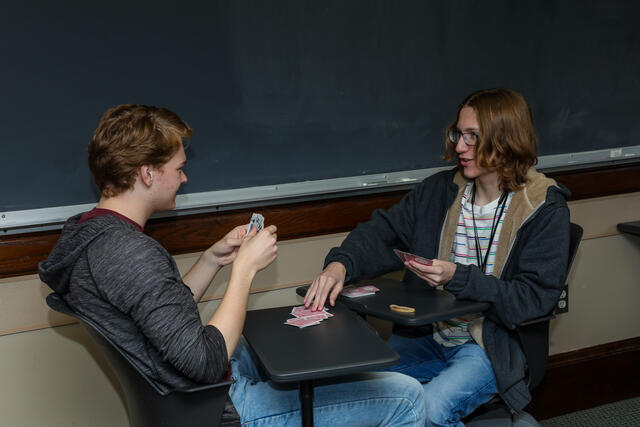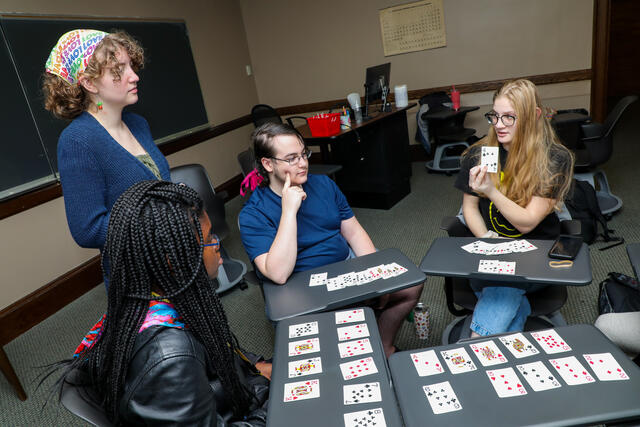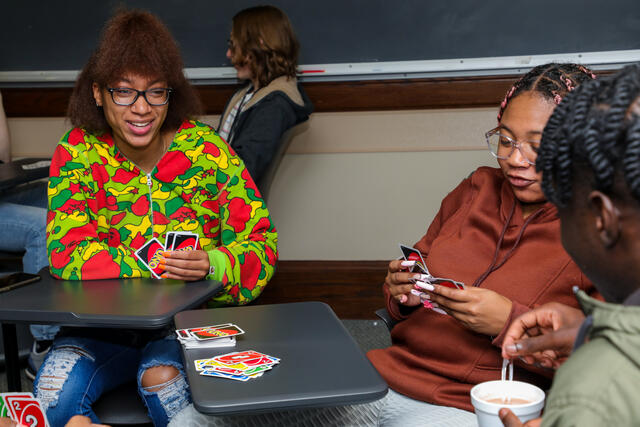First-year students discover unseen math in puzzles and games
From cards to board games, you can find math in surprising places, as students in the First Year Seminar Unseen Math in Puzzles and Games are learning from Senior Lecturer of Mathematics Michele Gribben '87. The interdisciplinary course is one of many First Year Seminars that introduce the newest Green Terrors to academics and resources at McDaniel.

Students in Senior Lecturer Michele Gribben’s First Year Seminar (FYS) Unseen Math in Puzzles and Games are discovering the mathematical principles beneath some of their favorite games.
“For many games, it turns out that there’s a pattern, even a rule where you can look at certain things and determine the outcome,” says Gribben. Your first move in Connect Four, for example, can guarantee a win.

Charlie Hoyle and Joe Burton play a round of blackjack.
“It’s my favorite class. Most people just play a game for fun, but I’ve always wondered about chance and probability,” says Joe Burton, a first-year Applied Mathematics major from Bel Air, Maryland. “It’s a lot of critical thinking, and we learn new ways of looking at things."
At the start of a recent class, Burton played a game of blackjack with classmate Charlie Hoyle, a Cinema major from Newton, North Carolina. “I’m not a big math person, but I’m really interested in the puzzles,” says Hoyle. Logic, strategy, and problem-solving are core components of the course.
One of the first exercises students do in the course involves a game of dominoes, which illustrates the definition of a complete graph from graph theory. Although most games may not be designed with math in mind, Gribben says, they are still an effective way to introduce the ideas. Through games, students absorb concepts about probability, topology, and game theory.
“A lot of math is about playing with things, trying new things, and being curious."
“I’ve taken this class every year that I’ve been at McDaniel,” says peer mentor Sarah England. “So, you know this class is good because it’s the third time I’m taking it.”
The junior Mathematics major with a minor in Computer Science enrolled in Unseen Math as a first-year student, after enjoying a discrete mathematics course in high school.

Sarah England watches as Katy Franklin, a Physics major from Pikesville, Maryland, explains the card game Presidents.
During her sophomore and junior years, England has served as peer mentor for the class, sharing her enthusiasm for math with new students. When she isn’t helping first-year students with all things mathematical and McDaniel, she serves as a learning assistant in the STEM Center.
“I learned things in Unseen Math that I’ve applied moving forward. I don’t think I realized just how much the things I learned in it would apply to my Computer Science minor, too, like truth tables and binary,” she says.
In a recent class, students sat down to play ultimate tic-tac-toe. In addition to being a much trickier version of the classic game, it hones logical reasoning and demonstrates how a player’s strategy can control the final outcome.
“I learned how to win at tic-tac-toe,” says Emily Dufrane, an Engineering major from Falls Church, Virginia. “This class is very enjoyable, and it’s helping me so much with math.”
A core part of the McDaniel Plan, FYS courses support first-year students’ transition into college academics and the liberal arts. Unseen Math emphasizes quantitative reasoning to develop their analytical skills. For their final project in the course, the students will use resources in Hoover Library to complete a research essay and presentation about the origin and strategies of a game.

First-year students Jalayah Brooks, Briona Nash, and Sie Coulibaly play a game of UNO.
“A lot of math is about playing with things, trying new things, and being curious,” says Gribben.
Like all McDaniel College courses, the small class size — in this case, 18 students — means students receive mentorship from faculty and peer mentors, and form friendships that transcend majors.
“One of my goals is to build community within the class. Playing games is a great way to do that,” says Gribben.
“Professor Gribben knows everyone’s names and is very personable,” says Dariel Gray, who is a Computer Science major from Bowie, Maryland. “I’ve learned responsibility in this class, and I now go to the STEM Center all the time. I’m even going there tonight.”
“It’s the best First Year Seminar I’ve ever taken,” says Justin Edwards of Silver Spring, Maryland, whose classmates, after some laughter, respond by saying it’s the only one he’ll ever need to take.